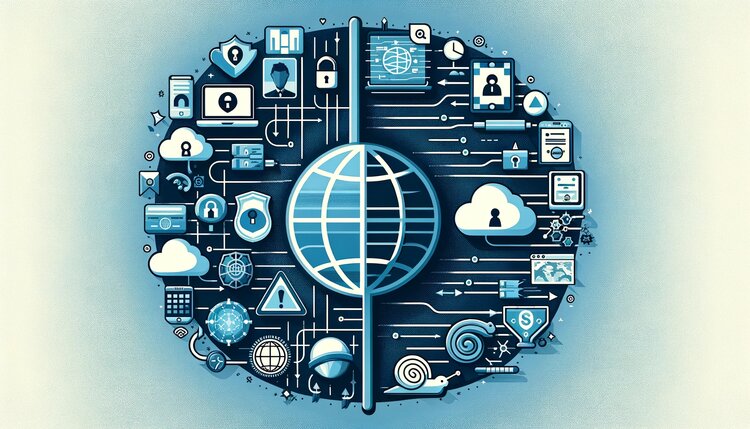If you've decided to get a VPN, you're surely interested in its advantages and strengths, as well as its weaknesses and drawbacks. It's definitely a very useful tool that allows you to navigate the internet anonymously and opens up possibilities that would otherwise remain inaccessible to you. Let's take a closer look at the details.
In Short - What is a VPN Connection?
This term is increasingly appearing among internet users, so it's good to know something about it. VPN is an acronym for Virtual Private Network, which is a means of ensuring anonymity and at the same time a very effective security tool. It essentially also protects your privacy, prevents targeted ads, and stops the tracking of users and misuse of location services. As a VPN user, you can use a secure encrypted connection between two networks or between a specific user and a network. This means that with a VPN, you can use the internet in complete privacy.
With a VPN, you don't have to worry about your activities being tracked. This virtual private network can mask you and ensure your undetectability. It reliably hides your activities so that they are not visible to anyone. In addition to encrypting transmitted data (which is often used by companies), it also hides you under a different IP address. Encryption of data occurs in both directions, i.e., when sending and receiving data. When you connect to the internet network, the source of the connection appears to be one of the VPN routers, not yours.

Why Do You Actually Need a VPN?
Your connection provider may continue to pass on your confidential data, geographical location, health data, browser history, and other data to anyone who offers a high enough reward for it. However, if you use a VPN, you ensure such privacy that not even your provider can track your data. If you use public Wi-Fi hotspots for surfing in your free time, the protection provided by VPN is also very practical and highly effective. It even protects you from a potential hacker who might be connected to the same hotspot.
Specific Advantages of Using a VPN
- Using a VPN perfectly hides you; no one can determine where you are actually connecting from
- Before connecting, you can choose from various IP addresses, often with IP addresses available from around the world
- If you want to visit a streaming service abroad that you normally use at home, it might not be available at that location. But if you set your country's IP address, you can use your favorite sites as if you were at home
- Access to some institutions' websites (schools, libraries, etc.) is restricted, but you can easily get to them via VPN
- In some countries, access to certain information is restricted; VPN can help bypass this censorship
- VPN also protects you from price discrimination, in two ways. First, from displaying higher prices, which sometimes happens to those identified as residents of larger cities (i.e., people with higher incomes). Second, from tracking your shopping habits and tailoring product offers to you
- Protection from tracking is a risk you constantly face. With VPN, hackers, cybercriminals, government agencies, and your connection provider won't be able to track you.
- VPN allows access to geographically restricted content, including streaming servers (such as popular Netflix or BBC)
- If some websites change content or even the entire website depending on your location, you can easily bypass this with a VPN
Negatives of Using a VPN
- When using a VPN, due to passing through more servers, the speed of the connection may slightly decrease. VPN operators are aware of this problem and are trying their best to optimize speed so that streaming and playing demanding games via VPN is possible without issues
- There is no established standard for the quality of VPS services (QoS - Quality of Services), so you need to rely on serious offers and shared experiences of others when choosing
- Some companies are starting to block known IP addresses, but VPN service providers simply solve this by adding new ones that allow connection again
- You must realize that even though VPN encrypts your connection and protects privacy, you are identifiable based on browser cookies. Therefore, it is recommended to turn off their use
What Devices Can VPN Be Used On?
Simply put, by using a VPN, you will have your privacy reliably protected, whether you connect through any device, such as a PC, tablet, iPhone, Android smartphone, and others. Most VPN services even allow the connection of several devices simultaneously with one account! The optimal solution is to set up VPN directly on your router